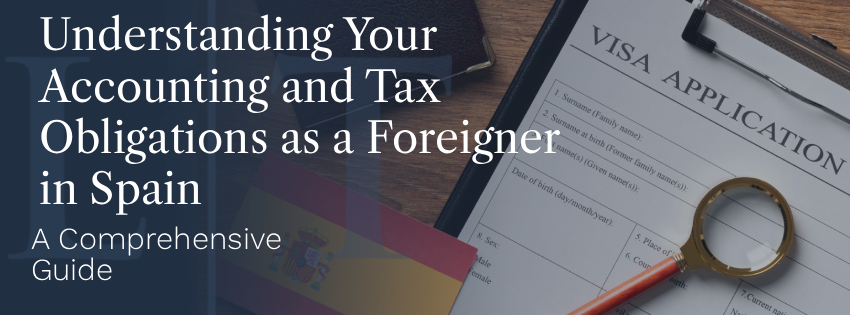Moving to Spain offers a world of exciting new possibilities, whether you are a digital nomad, an investor, a business owner, or a retiree. The allure of its vibrant culture, favorable climate, and high quality of life is undeniable. However, navigating the country’s financial and administrative landscape can be one of the most complex aspects of settling in. A fundamental source of anxiety for many foreigners is understanding their accounting and tax obligations.
Common questions frequently arise:
- As a non-resident, do I need to file taxes if I only live in Spain for a part of the year?
- What accounting rules apply if I set up a company or purchase a property?
- How can I ensure compliance and avoid severe penalties for mistakes or omissions?
At Lextax, we believe that managing your finances in Spain should not be a source of stress. Our role is to act as your trusted advisor and translator of complexity, providing clear, practical guidance to simplify Spain’s tax and legal systems. We ensure you remain fully compliant, mitigate unnecessary risks, and optimize your financial position from the moment you arrive.
The Scope of Your Obligations: What It Means to Be a Foreigner in Spain
Your specific accounting and tax obligations in Spain are not one-size-fits-all. They depend entirely on your unique circumstances and legal status. It is crucial to determine which of the following categories applies to you, as each comes with a distinct set of responsibilities.
- Spanish Tax Resident: You are considered a tax resident if you spend more than 183 days within a calendar year in Spain, or if your main economic interests (your primary business or professional activities) are located here. As a resident, you are required to declare your worldwide income and assets to the Spanish tax authorities. This is a critical distinction that many foreigners fail to grasp, leading to significant compliance issues.
- Non-Resident: If you reside abroad but own property, have investments, or generate any form of income from a Spanish source, you are subject to non-resident income tax. Even if you spend minimal time in the country, you have a clear legal obligation to report and pay taxes on this Spanish-sourced income.
- Entrepreneur or Company Owner: Establishing a business in Spain, whether it is a small freelance venture or a larger corporate entity, comes with a separate set of stringent accounting and corporate reporting obligations. You must adhere to the Spanish Commercial Code and maintain precise financial records.
Key Accounting and Reporting Obligations for Foreigners in Detail
Understanding the specific forms and deadlines is paramount to maintaining good standing with the Spanish tax authorities. Here is a breakdown of the most common obligations you may encounter:
1. Annual Income Tax Returns
- For Residents (Modelo 100): If you are a Spanish tax resident, you must file the Declaración de la Renta (Form 100). This comprehensive return is used to declare all your income, regardless of where it was earned—be it from a salary, self-employment, investments, or foreign pensions. It’s a crucial tool for ensuring you benefit from all relevant deductions and credits.
- For Non-Residents (Modelo 210): As a non-resident, your obligations are simplified but no less important. You must file Form 210 to declare income generated in Spain, most commonly from rental properties. Even if you do not rent out your Spanish property, you are legally required to file a Form 210 to pay a «deemed rental income» tax.
2. Wealth Tax (Impuesto sobre el Patrimonio)
Spain’s Wealth Tax is a topic of great concern for many foreigners. It applies to both residents and non-residents who own assets in Spain that exceed certain thresholds. These thresholds vary by region, with some regions offering significant reductions or even full exemptions, a factor that highlights the importance of expert advice on regional fiscal differences.
3. The Modelo 720: Foreign Assets Declaration
This is one of the most critical and heavily scrutinized reporting requirements. All Spanish tax residents must file Form 720 to declare any overseas assets—including bank accounts, investments, and properties—if their value exceeds €50,000. Failure to comply or providing inaccurate information can result in extremely high penalties, often far exceeding the value of the assets themselves. Lextax provides specific support to ensure this complex declaration is handled with precision.
4. Corporate Accounting and Reporting Obligations
If you have chosen to set up a company in Spain, your responsibilities extend beyond personal taxes. According to the Spanish Commercial Code, you must:
- Maintain official accounting books in strict accordance with Spanish law.
- Prepare and file annual accounts with the Mercantile Registry (Registro Mercantil).
- Declare and pay Corporate Income Tax (Impuesto sobre Sociedades) on an annual basis.
5. VAT (IVA) Reporting
Any business or self-employed individual that carries out a commercial activity subject to Value Added Tax (VAT) in Spain must register for IVA. This involves filing regular VAT returns (usually quarterly via Form 303) and an annual summary (Form 390).
6. Other Common Filings
Depending on your specific activities, additional filings may be required, such as:
- Modelo 347: An annual declaration of transactions with third parties if the total value exceeds €3,005.06.
- Modelo 349: A declaration for transactions carried out within the European Union.
- Payroll & Social Security: If you employ staff in Spain, you must manage payroll and social security contributions and reporting.
The High Cost of Non-Compliance
Spain’s tax agency, the Agencia Tributaria, is well-equipped to detect non-compliance, particularly with the increase in international data sharing. The penalties are severe and can include:
- Fixed fines for late or incorrect submissions.
- Percentage-based penalties on undeclared or under-declared amounts, which can be substantial.
- Accrual of interest on all overdue taxes.
- Legal and reputational risks that can impact your ability to do business or live peacefully in Spain.
This is precisely why professional guidance is not a luxury, but a necessity. Compliance in Spain is not optional, and a single mistake can result in a financial burden that far outweighs the cost of expert advice.
Why Lextax Is Your Ideal Partner in Spain
Foreigners often find themselves overwhelmed by the Spanish system due to complex paperwork (often only in Spanish), frequent legislative changes, regional tax differences, and the sheer volume of reporting requirements.
At Lextax, we help you overcome these barriers with a holistic approach and a deep understanding of your needs. Our team of bilingual experts provides a full range of accounting and tax services for foreigners, including:
- Tax Residency and Obligation Assessments: We perform a detailed analysis of your personal circumstances to correctly determine your tax residency status and outline all your obligations from the outset, providing a clear roadmap for compliance.
- Tax Return Preparation & Filing: We manage the preparation and submission of all your personal and corporate tax returns, including income tax, non-resident tax, VAT, and corporate filings.
- Full Company Accounting Services: We handle all your bookkeeping, payroll management, and the preparation of annual accounts, allowing you to focus on growing your business.
- Wealth & International Tax Advice: We provide strategic advice on asset structuring to minimize tax liabilities, including expert guidance on the complexities of the Wealth Tax and foreign asset declarations.
- Modelo 720 Compliance: We specialize in ensuring the correct and timely filing of Form 720, protecting you from crippling fines.
With Lextax, you can gain complete peace of mind, knowing that every detail of your accounting and tax obligations in Spain is being managed by a team that understands the challenges faced by international clients.
FAQs: Accounting for Foreigners in Spain
Do I need to file taxes in Spain if I live here for less than 183 days?
Yes. If you are a non-resident but own property or generate any income from a Spanish source, you must file non-resident tax returns (Modelo 210) on that specific income.
What is Modelo 720 and is it mandatory for foreigners?
Modelo 720 is the declaration of foreign assets. It is mandatory for all Spanish tax residents who own overseas assets (e.g., bank accounts, investments, properties) valued at more than €50,000. It is a critical and strictly enforced obligation.
What are the key accounting rules for a foreigner who opens a company in Spain?
A company in Spain must maintain official accounting books, file annual accounts with the Mercantile Registry, and submit an annual Corporate Income Tax declaration. These rules apply regardless of the owner’s nationality.
What are the specific obligations for digital nomads in Spain?
If a digital nomad becomes a Spanish tax resident, they must declare their worldwide income. However, Spain’s Digital Nomad Visa offers a special tax regime (the Beckham Law), which can provide a significant tax advantage.
Can Lextax help me manage my accounting obligations remotely?
Yes. We are experts in providing comprehensive remote accounting, tax compliance, and advisory services for foreigners who are living, investing, or running businesses in Spain. We manage your obligations so you can focus on your life or business, no matter your location.
Conclusion
Navigating your accounting obligations in Spain can be complex, but it is a fundamental part of a successful move. Whether you are a resident, a non-resident property owner, or an entrepreneur, compliance is the key to avoiding fines and optimizing your financial position.
At Lextax, we make Spain’s accounting system clear and manageable. We give you the confidence to focus on your personal and business goals, safe in the knowledge that your financial affairs are in the hands of seasoned professionals.
Need clarity on your accounting obligations in Spain?
Contact Lextax today for tailored advice and ensure full compliance with Spanish law.


